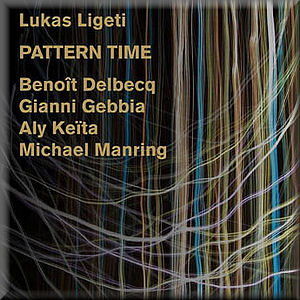1. Without Prior Warning [4:24]
2. On Patterned Time [14:44]
3. Timelessnesses [8:12]
4. From the Ground Up [4:31]
5. Translucent Dusk [7:23]
6. A Hook in the Sky [3:29]
7. Tunnels Alight [13:24]
Lukas Ligeti (drums, toy balafon)
Benoit Delbecq (piano, prepared piano)
Gianni Gebbia (alto saxophone)
Aly Keita (balafon)
Michael Manring (electric bass)
Son of the renowned and influential Gy”rgy Ligeti, composer and percussionist Lukas Ligeti has long been involved in contemporary 'classical' music but is also known for his experimental forays into jazz and 'world' music genres, including African Burkinabe music with his group Burkina Electric. With Pattern Time Ligeti extends this line of exploration, but the sound and feel of the music is from the outset more 'jazz' than anything you are likely to find in more usual modern music programmes.
The musicians on this album were brought together by Ligeti as the result of an invitation by the Vienna Musik-Galerie festival in Austria, and the basic premise of the quartet is for the development of an interest in new rhythmic possibilities in improvised music. As both the title of the album and the instrumentation suggest, the material indeed inhabits more of a rhythmic idiom than a melodic/harmonic one, and the musicianship is one of carefully conceived, disciplined and sensitive improvisation.
Michael Manring's bass is a distinctive feature of the group, continuing the sound and expressive potential passed down by his teacher Jaco Pastorius. The bass and saxophone sonorities with exotic percussion do invite and occasionally meet comparison with Weather Report, and fans of that group's creative spirit will be intrigued by what is going on in Pattern Time.
With basically improvisational work springing from ideas, concepts and rhythmic impulses from Lukas Ligeti, there are a few moments where you have the feeling the changes could have been a little sharper, one or two the numbers turning out a tad more compact as a result. Most of the numbers are tight enough, but On Patterned Time for instance there are periods in the fourteen or so minutes which have the feeling of a cyclical labyrinth from which the musicians are finding difficulty escaping. Escape they always do however, and there are some fascinating sonorities in the final third of the piece.
Patterns imply repetition with forms of variation, and this is a big feature of this music. The rhythms are not really the kind which make you want to get up and dance, but this kind of 'art music' project isn't set up for that kind of joyous abandon, and the booklet notes go some way towards explaining where some of these ideas come from. These include Ligeti's experience with a recording of traditional court music from Buganda in Uganda, which involves interlocking melodies played at such a rate of speed that the players "need to hear the music from different vantage points in order to remain in coordination. each [feeling] the downbeat at a different time." It is impossible to say if this kind of music will irritate or inspire: tastes and moods will define one's response, but at least the innova website offers samples of their releases as a foretaste. My own position on this is a complex or as simple as the music itself, and I suspect I won't be the only one who can simultaneously hear inane meandering and subtle interactions in a number like Timelessness. Lukas Ligeti's driving jazz drums against the native pling-pling of Aly Kedta's balafon creates moments which project blind contradiction and dramatic juxtaposition at the same time. The restricted number of notes apparently available to some of the African instruments is also an element in these pieces. Parts of a number like Tunnels Alight reminds me a bit of walking down the percussion corridor at the conservatoire where I work - with a marimba player testing sticks under the staircase while a combo rehearses oblivious in a nearby study room. The recording has a role to play in this, with the perspective on some instruments rendering them apparently closer than others.
This album is more of an ensemble-conceived programme than one which allows for much solo work. That said, Ligeti's drum lead in From the Ground Up allows him to take flight here and there, and the reverse is the case in Translucent Dusk, where the colours and textures of the African instruments are to the fore. BenoŚt Delbecq's piano is often restrained to the point of invisibility, and of the instruments involved the modern grand is something of an odd man out. The prepared piano effects mix effectively with the ethnic percussion however - to such an extent that its involvement might not be as apparent as the reality; one of those elements you miss more when it's taken away than when it's been around for a while.
The innova website introduces this as "a fresh approach to both sound and rhythm, a musical conversation that uses a new syntax that comes across as immediately striking; an abstract language the listener can instantly understand - with enough motion to keep a restless octopus happy." This is the kind of album which needs time to sink in, and I have the feeling my ears may need time to mature towards a really satisfactory assimilation of its contents - something which on first encounter can be summed up in varying proportions of fascination and frustration. That said, I have to admit to a deep appreciation of what makes up these organic narratives, and whatever anyone says this is certainly original and very 'different'.
Dominy Clements
